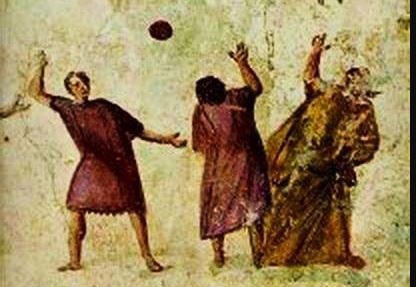Rugby enthusiasts might be surprised to learn that the origins of this intense and passionate sport can be traced back over 2,000 years to the Roman game known as harpastum. This ancient sport was not only a popular pastime but also a reflection of the physical prowess and military strategy of the time, played during the Roman occupation of Britain in the 1st century BC.
What was harpastum?
Derived from the Greek word ‘seize’, harpastum was a ball game that required both physical skill and cunning. It was played with a small, hard ball, which players tried to seize and keep in their possession despite attempts by the opposing team to snatch it away.
Rules of the Game
The exact rules of harpastum are largely unknown, but historical records and references allow us to sketch a basic idea of how it was played:
- Teams: The game was played between two teams, each trying to carry the ball into the opponent’s territory, much like rugby is played today.
- Playing field: It was played on a rectangular field, marked with boundary lines and possibly a central line that teams had to cross.
- Objective: The main goal was to pass the ball through the opponent’s end line to score points. However, unlike modern rugby, there were no goal posts.
- Physical contact: Contact was a fundamental part of the game, allowing the use of force to wrest the ball away and stop opponents’ progress.
- Duration: Matches lasted until one team reached a set score or simply until physical endurance no longer allowed.
Harpastum was not just a game; it was a training tool for Roman soldiers, designed to improve their gripping and combat skills, crucial for hand-to-hand fighting. Although this game might seem primitive compared to the highly organized and regulated sport we know today, the similarities in goals and the physical nature of the game make harpastum a clear precursor to modern rugby.
Harpastum shows us how ball games have been an integral part of societies throughout history, not only as a form of recreation but also as a means to develop physical and strategic skills. From Roman playing fields to modern stadiums, the spirit of rugby has survived and evolved, but always retaining the essence of competition, strategy, and above all, an exhilarating spectacle.
